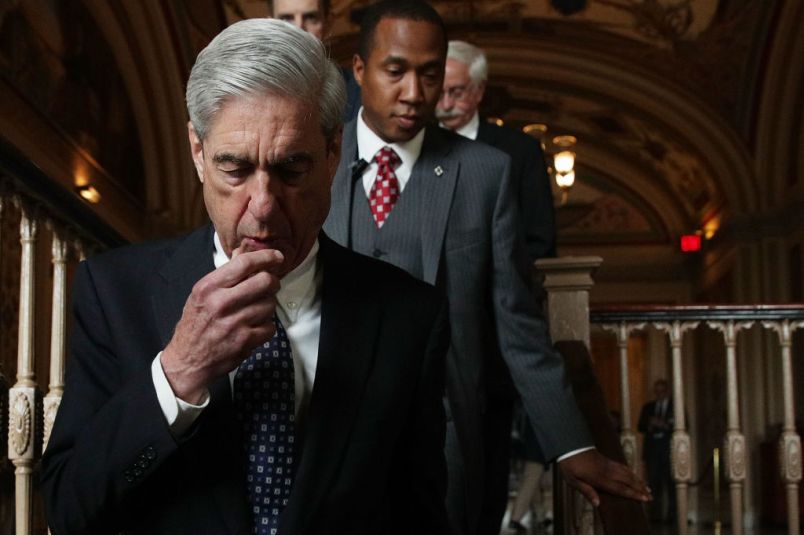Special counsel Robert Mueller’s team expressed concern Tuesday that sensitive information and investigative techniques used in its prosecution of Russian meddling in the 2016 election could wind up in the hands of Russian intelligence.
To head off that possibility, Mueller’s team has asked the judge in the case against a company accused of funding Russia’s social media election meddling to restrict access to discovery turned over to the company’s lawyers.
“Public or unauthorized disclosure of this case’s discovery would result in the release of information that would assist foreign intelligence services, particularly those of the Russian Federation, and other foreign actors in future operations against the United States,” Mueller said.
According to the filing, Mueller’s team and the lawyers representing Concord Management have had a number of discussions about agreeing to a joint protective order on discovery, but have failed to come together on a few key requests prosecutors are making about who should be authorized to view the materials.
Mueller’s team is seeking that access to the discovery materials be withheld from the other individuals and entities named as defendants in the Russian troll case who have not yet appeared in court. His proposed order would require that Concord Management get the court’s permission before giving those co-defendants access to the discovery.
The Mueller team also requested that if Concord Management’s attorneys want to turn over discovery to any foreign nationals, they identify the foreign nationals for both the court and for a government lawyer separate from Mueller’s team, called a “firewall counsel,” and then get the court’s approval.
“If needed, firewall counsel would alert the Court to any concerns or considerations about such disclosures,” Mueller proposed in the filing.
He cited specifically the possibility that “certain foreign individuals” may try to view discovery materials “as a way to obtain sensitive materials as part of an intelligence collection effort.”

Concord Management has been charged with conspiracy to defraud the United States. The company, according to Mueller, is controlled by Yevgeniy Prigozhin, a Kremlin-linked restaurateur nicknamed “Putin’s Chef,” who is also an individual defendant in the case, but one who has not yet appeared in court.
“As long as Prigozhin chooses not to appear personally in front of this Court, he is not entitled to review any discovery in this case,” Mueller argued Tuesday.
Mueller said, however, that his proposal would allow Concord Management’s attorneys to order “to seek to modify the order after counsel reviews discovery materials.”
“Likewise, if Prigozhin appears before this Court, the protective order would not bar providing discovery to him as an authorized party,” Mueller said, referring to a request Mueller says Concord Management’s attorneys made “that they be permitted to share discovery with a codefendant if that co-defendant is an officer or employee of Concord Management.”
“To the government’s knowledge, the only charged defendant in this category is Yevgeniy Viktorovich Prigozhin, who was charged individually for conspiring to defraud the United States,” Mueller’s filing said.
In support of its position, Mueller’s team also claimed ominously that discovery in the case could reveal players who are still actively involved in election interference efforts, but who have not yet been charged.
“[T]he substance of the government’s evidence identifies uncharged individuals and entities that the government believes are continuing to engage in interference operations like those charged in the present indictment.”
When Mueller first brought charges in February against 13 Russian individuals and three entities accused to facilitating the social media campaign to influence the election, few thought the case could ever make it to a courtroom, given the unlikelihood that Russian President Vladimir Putin would extradite those named in the indictment.
In April, two U.S.-based attorneys — Eric A. Dubelier and Katherine Seikaly — entered an appearance in the case on behalf of Concord Management. They soon after sent prosecutors a sprawling request for discovery before appearing in court to enter Concord Management’s plea, or even confirming that Concord Management had accepted the summons.
Since then, Dubelier has been combative with prosecutors in public court proceedings.
Prosecutors on Tuesday said that due to its formatting, it would be difficult to redact sensitive information in discovery, which also includes personal details of the Americans whose identities the Russians are accused of stealing.
“The evidence in this case will also include numerous reports and affidavits filed in connection with this investigation that describe investigative steps, identify uncharged co-conspirators, and disclose various law enforcement and intelligence collection techniques,” the filing said.
Read the court filing and the proposed order below:







Well if any of the sensitive information has been provided to Nunes, you know the White House, and therefore probably the Russians, already have it.
From a litigation point of view, Mueller’s requested protective order seems quite sensible and reasonable.
These seem like exciting, uncharted, and above all stupid waters. Phony War with our CinC fawning over the enemy. Going great, everyone.
““[T]he substance of the government’s evidence identifies uncharged individuals and entities that the government believes are continuing to engage in interference operations like those charged in the present indictment.””
More indictments to come? YES PLEASE!!!
I have to admit, I’ve never heard Dotard called “Russian Intelligence” before.
Russian Accomplice? Yes.
Criminal case? Yes…
He has a beautiful mind.